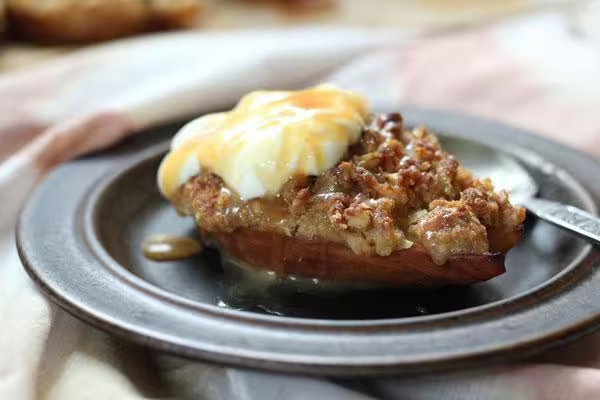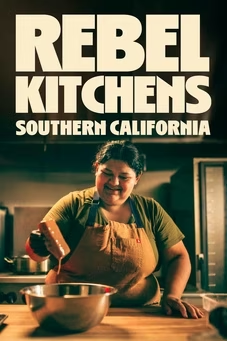
Fiddleheads
Season 7 Episode 5 | 6m 2sVideo has Closed Captions
Harvesting fiddleheads is a springtime tradition in Wabanaki culture.
Lisa and Andrea Sockabasin have been harvesting fiddleheads since they were little girls, a springtime tradition in Wabanaki culture, and one that has been passed down across thousands of years of generations.
Problems playing video? | Closed Captioning Feedback
Problems playing video? | Closed Captioning Feedback

Fiddleheads
Season 7 Episode 5 | 6m 2sVideo has Closed Captions
Lisa and Andrea Sockabasin have been harvesting fiddleheads since they were little girls, a springtime tradition in Wabanaki culture, and one that has been passed down across thousands of years of generations.
Problems playing video? | Closed Captioning Feedback
How to Watch Kitchen Vignettes
Kitchen Vignettes is available to stream on pbs.org and the free PBS App, available on iPhone, Apple TV, Android TV, Android smartphones, Amazon Fire TV, Amazon Fire Tablet, Roku, Samsung Smart TV, and Vizio.

Get More Kitchen Vignettes
Get more recipes on the Kitchen Vignettes blog. Available on PBS Food.Providing Support for PBS.org
Learn Moreabout PBS online sponsorship(gentle music) (birds chirping) - [Lisa] My name is Lisa Sockabasin.
I am Passamaquoddy from Motahkomikuk, which is located in present-day Washington County, Maine.
(Andrea speaks in Indigenous language) - [Lisa] We work at Wabanaki Public Health and Wellness, which is a nonprofit serving Indigenous people all throughout the state of Maine.
We are part of the Wabanaki, the People of the First Light, which is the Penobscot, Passamaquoddy, Mi'kmaq and Maliseet.
Our traditional homelands span the entire state.
Now we are mostly located in Washington County.
- [Andrea] We are harvesting fiddleheads on Olamon Island in Penobscot Nation territory.
So before harvesting fiddleheads or anything from the Earth, we're offering tobacco, which is our first sacred of medicine, and we're offering that as a thank you.
The Earth is providing sustenance through fiddleheads and we're providing reciprocity and saying thank you in return.
- [Lisa] It's about providing a gift where you're receiving a gift.
We do that in everything that we do.
- [Andrea] Fiddleheads are the Ostrich fern, and they grow in wet marshy environments and they are typically harvested late April, early May.
What we know, as Indigenous people, is that healing comes from the land, that nourishment comes from Mother Earth, and it is our responsibility to care for her as much as she cares for us.
And so, it goes back thousands of years this reciprocity with the land, and being nourished from what she offers and being able to harvest fiddleheads today is something that connects us to thousands of years of our ancestors doing just what we're doing today, getting nourished from our land.
To harvest fiddleheads really reminds me of my childhood.
It brings me back to my connection with my father, who is no longer here, and that's what we would do, is go along the banks and collect fiddleheads and enjoy what our earth has to offer us.
- [Andrea] Fiddleheads or harvesting anything from the land is important to me.
For one, that's our connection.
That's traditional knowledge that was passed down from our ancestors.
And when we go out and harvest, we're then passing that information on to the next generation.
- [Lisa] We must care for our land for our land to care for us.
And what we have seen is the poisoning of our land, our very land that grows our vegetables, that is the home of our animals that we eat.
You know, our fiddle heads are right along waterways, but our land heals us only if we provide healing to her.
And that's a big part, I think, of my experience, when we're collecting fiddleheads, is thinking about that responsibility.
Making sure that we are always aware how connected, what we put in our mouth, how that is connected to the land and making sure that what is coming from our land is truly healthy and abundant and free of toxins.
It teaches us a lot about our responsibilities.
(gentle music) (birds twitter) - [Andrea] The recipe we are making today is sauteed fiddleheads which we harvested from our tribal territories, sauteed in olive oil, garlic, salt and pepper.
So, after harvesting fiddleheads, we wash the brown papery husk that is on the outside of the fiddleheads, ensuring that that's removed as well as any dirt or soil.
We will then boil for 10 to 15 minutes, removing the toxins from the fiddlehead, which we then will strain that in place in ice water which slows down the internal cooking and cools the fiddleheads completely.
At that point, we move them over to the frying pan and we saute for about one to two minutes and then add some salt and pepper to taste.
- [Lisa] Fiddleheads are definitely unique.
It's something that I look forward to every single spring, because it is such a unique vegetable.
- [Andrea] Harvesting my own food means I know where it came from, I know it was harvested sustainably, and I know it was harvested with reciprocity.
So ensuring that the lands that's giving to us, we're also providing that nourishment back to the earth.
- One important thing to us as Indigenous people is a recognition of where we are and being able to sit here today and cook in a kitchen, and make fiddleheads, in a home that is, in a couple weeks, will be housing Wabanaki women that are looking for healing and recovery services.
It's an honor to be in their space and I can't wait to welcome them into this home.
I think fiddleheads is the perfect first meal to be eaten in the dining room.
(bright upbeat music)
Support for PBS provided by:















